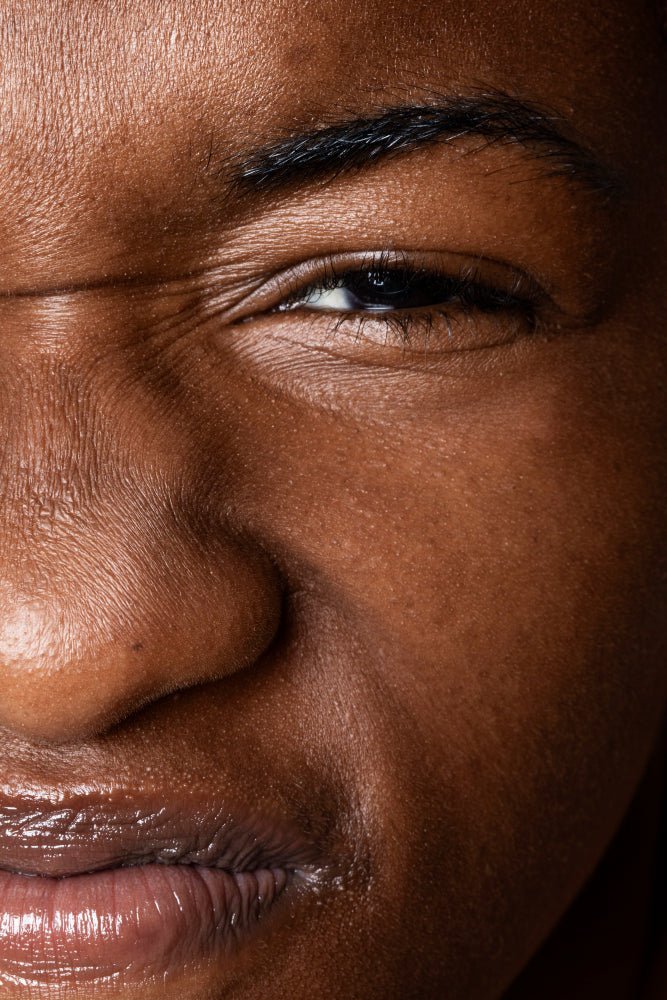Elasticity is the backbone of youthful, supple skin. It gives your skin the much-desired bounce and resilience. For people with dark skin, understanding and caring for elasticity is essential to maintaining a vibrant appearance.
Skin elasticity is the ability of your skin to stretch and then return to its original shape and position. It’s the reason your skin can withstand daily movements and expressions without breaking down or wrinkling too much. Think of it as the “snapback” quality that keeps your skin looking young.
In this comprehensive guide, we’ll explore the causes of poor elasticity, its effects on dark skin, and how to prevent and treat it. We’ll also delve into the breakdown of elastin and collagen and how to repair these vital components.
Table of Contents
1. What are elastin and collagen?
2. Causes of impaired elasticity
3. Effects of impaired elasticity
4. How to prevent weak skin elasticity
5. How to deal with impaired elasticity
6. Creating a durable skin care routine
1. What are elastin and collagen?
Before we dive into the world of elasticity, let’s understand the key players: elastin and collagen.
• Elastin: Elastin is a protein found in the connective tissues of the skin and other organs. It is responsible for the skin’s ability to stretch and then return to its original shape and position. Think of it as the “snapback” quality that keeps your skin looking young.
• Collagen: Collagen is another critical protein. Provides structure to skin, hair, nails and more. It is like the scaffolding that holds everything together. Collagen is responsible for the strength and firmness of the skin.
2. Causes and consequences of impaired elasticity
Causes of impaired elasticity:
• Aging: As we age, the production of collagen and elastin, the two main proteins responsible for skin elasticity, slows down. This natural aging process can lead to sagging, fine lines and wrinkles.
• UV damage: Prolonged exposure to the sun’s harmful UV rays can accelerate the breakdown of collagen and elastin fibers. This is a common concern for black skin, as the misconception that it is less prone to sun damage can lead to insufficient sun protection.
• Dehydration: Insufficient hydration can leave your skin dry and less resilient. It is essential to keep your skin well hydrated to maintain its elasticity.
• Poor nutrition: A diet lacking in essential nutrients, particularly vitamins A, C and E, can impair collagen production and, consequently, skin elasticity.
3. Effects of impaired elasticity
For people with dark skin, impaired elasticity can manifest in specific ways:
• Hyperpigmentation: Impaired elasticity can contribute to the formation of stretch marks, which are more noticeable in black skin due to its higher melanin content.
• Loss: As collagen and elastin fibers lose their strength, the skin can begin to sag, leading to a loss of definition, particularly around the jawline and neck.
• Fine lines and wrinkles: Reduced elasticity can lead to the development of fine lines and wrinkles, particularly around the eyes, mouth and forehead.
4. How to prevent weak skin elasticity
• Sun protection: Daily application of a broad-spectrum sunscreen with an SPF of at least 30 is non-negotiable. This protects your skin from UV damage by preserving collagen and elastin.
• Hydration: Keep your skin hydrated by drinking plenty of water and using a moisturizer suitable for your skin type.
• Balanced nutrition: Follow a diet rich in antioxidants, vitamins and minerals. Foods like berries, citrus fruits and leafy greens can support collagen production.
• Gentle skin care: Avoid harsh cleansers and exfoliators that can strip your skin of its natural oils and disrupt its moisture barrier. Choose gentle, moisturizing skincare products.
5. How to deal with weakened elasticity:
• Topical treatments: Look for skin care products that contain ingredients such as retinoids (retinol), hyaluronic acid and peptides. These can help stimulate collagen production and improve skin elasticity.
• Microneedling: Microneedling treatments, performed by a dermatologist or licensed professional, can stimulate collagen and elastin production by creating controlled micro-injuries to the skin.
• Dermal Fillers: Injectable dermal fillers, such as hyaluronic acid-based fillers, can temporarily restore volume and improve skin texture.
How to repair elastin and collagen:
• Retinoids: Over-the-counter or prescription retinoids can help repair and stimulate collagen and elastin production. Start with lower concentrations and gradually increase as your skin develops a tolerance.
• Vitamin C: Topical vitamin C serums can protect existing collagen and stimulate new collagen production.
• Hyaluronic Acid: Hyaluronic acid is a hydrating powerhouse that can improve skin texture and appearance by increasing moisture levels.
6. Building a resilient skin care routine
A well-rounded skincare routine is essential to cultivating elasticity in black skin. It should include:
• Cleanser: Choose a gentle, moisturizing cleanser suitable for your skin type.
• Sunscreen: Apply broad-spectrum SPF daily to protect against UV damage.
• Moisturizing cream: Use a moisturizer to keep the skin moist.
• Treatment products: Incorporate products with ingredients that boost collagen and elastin into your routine.
Cultivating elasticity in black skin is a journey that combines preventative measures, targeted treatments, and a commitment to self-care. By understanding the intricacies of elastin and collagen and implementing these strategies, you can enjoy stronger, healthier, more resilient skin.
